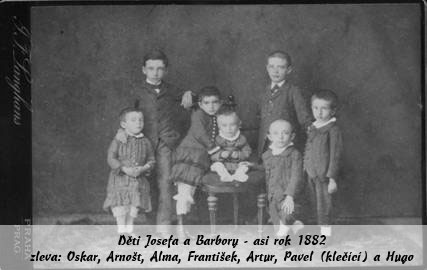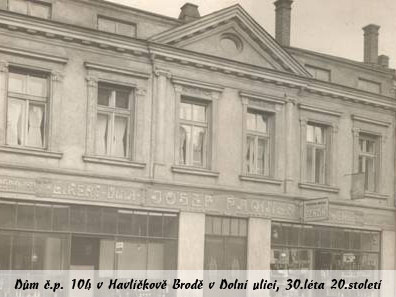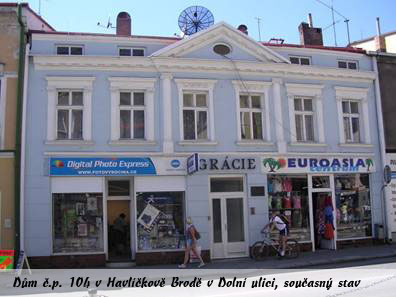OUR FINDINGS
BARBORA AND JOSEF PACHNER
Barbora was born June 16, 1841 in Bělá, near Ledeč nad Sázavou. She was called Betty within the family, and this name is also what the records of the Německý Brod census contain. Barbora married Josef Pachner, with whom she had seven children - six sons and a daughter: Arnošt, Artur, Pavel, Alma, Hugo, Oskar and František. Two mistresses usually helped maintain this large household. Barbara had diabetes and died from it on March 15, 1909. She is supposedly buried at the Havlíčkův Brod Jewish cemetery, but we were never able to find her grave, despite a thorough search.
Barbora's mother, Anna Taussig, born Pentlář, was born on March 27, 1812 in Nový Bydžov. In her later years, she lived with her daughter in Německý Brod. Her grandson František Langer recalls in his book "Byli a bylo" (or, "They were, it was...") that she lived in a little room with a window facing the courtyard. He also remembers an old fashioned commode she maintained in the room, in which she kept large sheets of "magronky", sweets made of nuts and almonds, which she offered to the children. She died on May 12, 1892 and is buried at the Havlíčkův Brod Jewish cemetery. Barbora's father, Samuel Taussig, was born on February 20, 1803, in Ledeč nad Sázavou, but that is all we know of his life.
Barbora had five siblings - two sisters and three brothers. Her sisters, Růžena and Johanna, were significant to us. Růžena, her married name being Langer, lived in Prague with her husband, a merchant. She lost her sense of hearing in her youth and avoided the public ever since. She had three sons - Jiří, Josef and František. Josef committed suicide just before being deported to Terezín. Jiří and František became known as writers. František was also a doctor and a legionary of the Czechoslovak legion in Russia. Both of them escaped the Nazis by leaving the country. Jiří, the author of the well-known book, "Devět bran", or "Nine gateways", fell ill during his long and complicated journey to Palestine by boat along the Danube river, and died of the disease in Tel Aviv, 1943. During the war, František lived in France and in Great Britain and worked as a literary advisor after returning in 1945, although his works were banned after 1948. He died in Prague in 1965, and is, among other things, the author of a well-known play called "Velbloud uchem jehly" ("A Camel Through the Needle's Eye", and memoirs "Byli a bylo" ("They were, it was"). The chapter about "uncle Kolman" and other relatives of the latter was a great source of information regarding the Pachner family for us.

The other sister, Johanna, who married a Rosenfeld, was a spectacular cook and the governess of an Jewish girls' orphanage in Prague. She is the grandmother of philosopher and mathematician Arnošt Kolman, who is also known as a great admirer of the USSR, despite being imprisoned for over three years after 1948. He didn't see the light till late in his life, when he wrote the book "Zaslepená generace" ("Blinded Generation"). Arnošt Kolman died in Sweden, 1979.
Josef Pachner was born on March 19, 1848 in Němčice near Ledeč nad Sázavou. We know very little of his childhood. His mother, Barbora Pachner, born Bretischová, died on October 31, 1896 at the age of 75 in Německý Brod. Her mobility was apparently reduced in her later years, as she spent all day in a large, customised armchair. František Langer writes in his memoirs that she was a very distinct, specific woman. She wore a large hat and had a bit of a beard. Langer recalled a sentence she used to comfort a poor Jew: "Poverty is of no shame, of the rich I defame the name." ("Chudoba cti netratí a polibte nám prdel, bohatí.". Young Josef Langer, František's brother reportedly called out this sentence to the surprise and entertainment of the neighbours when walking downtown. Barbora is buried in the Havlíčkův Brod Jewish cemetery. Josef's father, Menachem Pachner, came from Damírov, a little village near Zbýšov, in the Kutná Hora district. We found out no more records of his life.
Josef Pachner is known to have been one of the owners of the building at 104 Dolní Street in Německý Brod as early as 1879. It is a two floor row house with the longer side facing the street and a large hall on the second floor. The Baroque core of the building was built in the 18th century, although the facade of the building was altered in the latter half of the 19th century. The building partly burnt down along with eight other buildings in the street in 1843.


"It was a large house with huge staircases and rooms inside, a light shaft, courtyard gallery, and high attic... It had two floors, one facing the courtyard, the other facing the street." - František Langer's description of the building from the "Byli a bylo" memoirs. In the ground floor of the building, there was a drug store and a liquor outlet, both of which can be seen on preserved photographs. Barrels of wine and other beverages were stored on the courtyard behind the building. The seemingly very large building was fully utilised.
The owners of this building were among the municipal citizens with the right to brew beer, and could therefore buy shipments of beer from the city's brewery. One peculiarity is that between 1836 and 1839, Bedřich Smetana lived in the building during his high school studies. A memorial plaque on the building commemorates this. At the time, it was owned by a Mrs. Juliana Billanská. The building changed hands rather swiftly - Josef Pachner owned one half from 1879, while the other belonged to Eduard Stein. Josef Pachner's son Oskar bought Stein's share in 1915 and in 1922, he bought the remaining half from his father to become the sole owner. He owned the building until his death in 1937, when Pavel and Ida Pachner bought the building in an auction. After the arrival of the Germans on March 15, 1939, they pretended to sell it to their in-laws. Because of the date of the purchase, the building was confiscated during the war anyway, despite the fact that the Nuremberg laws didn't apply to the new owners. Today, the building holds apartments, a clothing store and a shop selling photographic equipment.
Josef Pachner was known mainly as a producer of rum and a Jesuit herbal liquor. According to František Langer, he was "comfortable and cavalier" - after lunch, he would often go to a café and smoke Trabuco cigars. The sizeable family apparently ran into slight financial bottlenecks from time to time. Apart from the family's own seven children, the sons of Barbora's sister Růžena often spent time in Brod. Langer remembers this period: "We would sleep in various places, two a bed and on chairs; we would eat at a very long table, the simplest and yet nutritious meals."
As was customary in Jewish families, a large portion of the family's budget was spent on education. All the sons of the Pachners studied with various levels of success for several years at the Brod high school. Three of the sons - Arnošt, Artur and František - continued their studies at the University in Prague and became successful doctors.
Josef was active in various endeavors. He was one of the founders of the Německý Brod Jewish cemetery, as well as active in the local Jewish community. He was its president between 1903 and 1905, and he was a member of its extended leadership in 1920. At the beginning of the 20th century, he is also recorded as a member of the Německý Brod town council. He actively participated in activities organised by Sokol.
Josef remarried after Barbora's death, probably in 1910. His second wife's name was Berta. She was born on November 18, 1865 in Koryčany u Kyjova. Josef and Berta Pachner lived in No. 149 Dolní ulice, which is now a corner sweet shop. Josef Pachner, according to a 1921 census, tended to his trade, while Berta was a housewife.
Josef Pachner died on March 3, 1922 in Německý Brod and was taken to Prague for cremation. He is supposedly buried in Havlíčkův Brod, but we never found his grave at the Jewish cemetery. We know nothing further on Berta Pachner, except that she probably lived in Brno in 1938, and the family believed she died during the war as well - the Terezín memorial records do not include a Berta Pachner born on that date, however.